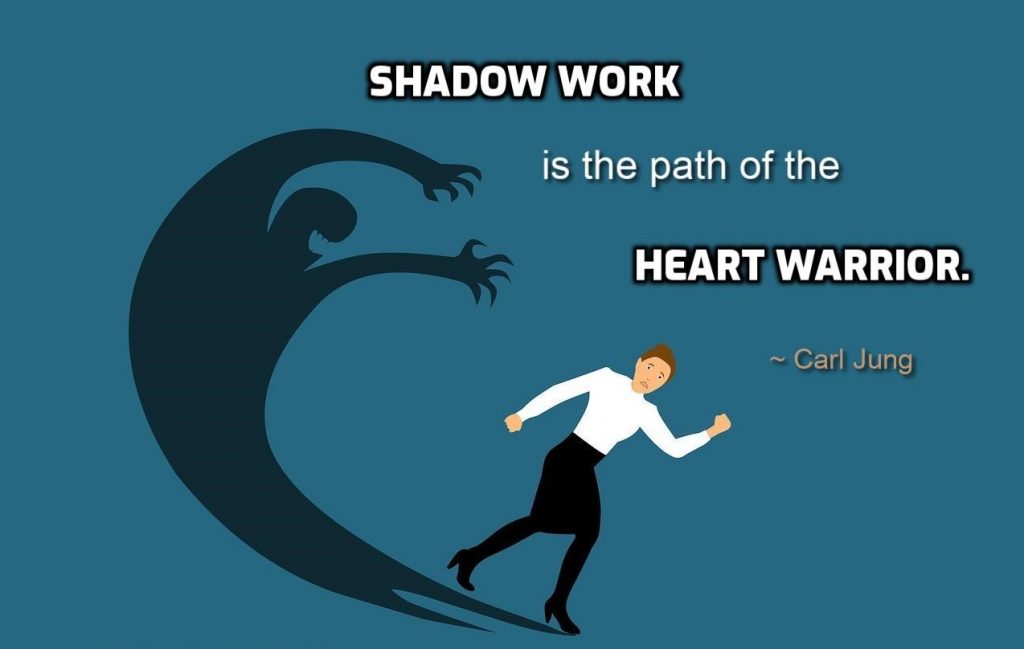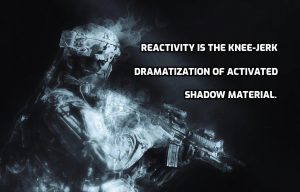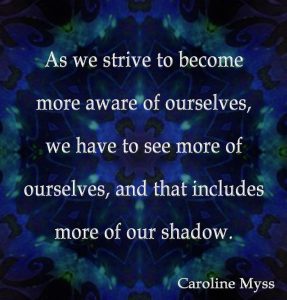
Bringing Your Shadow Into The Open
Are You a Heart Warrior?
Your shadow. Let’s face it; no one wants to go there. Yet, there is an immense feeling of relief when you do. So, why are most people reluctant? I have found the number one reason is fear. FEAR. Fear of discovering all the things you don’t like about others is residing within you and your subconscious.
Maybe you’ve reacted badly to a person or situation and wondered, “What the heck just happened? I don’t know why I did that.” 
Knowing your own darkness is the best method for dealing with the darkness of others. ~ Carl Jung
Whatever in ourselves we’re keeping in the dark doesn’t go away just because we don’t see, hear, or feel it. Actually, the more we deny it or push it away, the stronger it becomes, weaving its way into our everyday life. Take a few moments to complete the following sentences without thinking. Say your answers out loud and then immediately write what you just said. Later revisit your responses and add anything else that comes to you.
Looking Inside to Your Shadow
Something in me I often feel an aversion for is __________________________________________.
The emotion I’m least comfortable expressing is _________________________________________.
What I have a hard time admitting in an argument is ______________________________________.
What I’m most hesitant to express in a relationship is _____________________________________.
What I least want others to know about me is ___________________________________________.
I don’t like admitting that I am _____________________________________________________.
When I feel shame, what I usually do is _______________________________________________.
What I most readily judge others for is _______________________________________________.
I tend to give my power away when _________________________________________________.
Your responses point to things that are probably in your shadow, whether partially or fully. What matters here is that you’re turning toward your shadow, accessing some curiosity about what may be in it. Looking inside is a process of ongoing discovery; treat it as such. (Bringing Your Shadow Out of the Dark, by Robert Augustus Masters, Ph.D.)
Shadow Work and Reactivity
Much, if not all, of our shadow, was indoctrinated when we were small. Our parents told us how to act, how to feel, what was right or wrong; our behavior was being conditioned or programmed into what our parents thought was an acceptable form. Then our siblings, grandparents, teachers, and religious leaders layered conditions on us. These conditions became our beliefs.
We all have beliefs, 
They may, but not for long.
Your conditioning will always come back up, like an unwanted weed. One way of getting a handle on your reactivity is to admit to your self you’re reactive. Pause a moment. When you take time and step back from whatever it is that activated you, you begin to create space for the reactive you instead of continuing to identify with it. In a way, you are creating space for yourself as intervening in your own reactivity. As a result, you can acknowledge the shadow self and then begin the process of learning how to work with it.
It begins with awareness; then, the work follows.
Future posts will feature the following areas and more:
- Facing Anger: Do you believe anger is a negative emotion and shouldn’t be expressed, especially by women? When you were a child, did you have the ability to communicate it? Does getting angry threaten your relationships with others? Do you feel vulnerable when your anger arises? Did you suffer a loss or wound and use anger to suppress it?
- Facing Judgment: Do you judge others for how they look, what they wear, say, or do? Are you critical of, or do you find fault with another person, group of people, an idea, or situation? When we are unaware of our judgmental tendencies, we become angry, hateful, defensive, anxious, and isolated.
- Facing Your Inner Child: Do you throw a hissy fit because you didn’t get your way? Do you feel abandoned when a friend, family member, or partner does something without you? Do you have a deep fear of change, or are you unable to let go of something? Do you need to be validated and understood?
- Self-Sabotage Uncovered: Do you undermine your success in business, relationships, health, or finances? What fears have the most authority over you? Have you let creative opportunities pass by you? Do you wonder what keeps you from stepping outside your comfort zone? Do you fear a change of any type in your life?
Until next time, may you always live a life of love, joy, and happiness!
For more information on Shadow Work, contact Debbie, or schedule a session now!
Connect with me on Facebook, LinkedIn, and Twitter.


